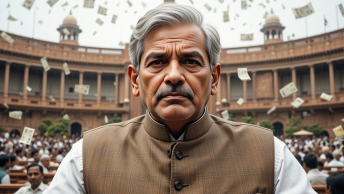S. Ganesh and Venkatesh Nayak. M. S. Ganesh is Senior Advocate, Supreme
Court of India and Venkatesh Nayak is with the Commonwealth Human Rights
Initiative, New Delhi.
is not telling the truth. That is not an option. Or else somebody is profoundly
innocent of constitutional law, praxis, conventions and Acts of Parliament.
Ignorance of law is no excuse either.
current imbroglio on situating the Opposition and its Leader in the Lok Sabha
is a pernicious and diabolic undermining of representative democracy by those
in – and with – Government. Potentially it is the Fourth Reich: it would take
the Svast out of Svastika.
reported opinion of the Attorney General to the Lok Sabha Speaker’s Office is
that the Leader of the Opposition (LOP) can emerge only from a party that has a
numerical strength of one tenth of the total membership of the House (See Kaul
and Shakdher, Practice and Procedure of
Parliament, 5th edn., 2001). The sole authority cited for this
opinion is a parliamentary precedent established by a ruling / direction of the
Speaker way back in 1956. However, these authors point out that “from the
Eleventh Lok Sabha onwards, … the practice of according recognition by the
Speaker in terms of Directions 120 and 121 was done away with” (id. at page 360).
event, the opinion of the Attorney General is confuted by (a) the
constitutional provisions, (b) the parliamentary debates, (c) the enacted
statute and (d) constitutional convention as codified and crystallised in that
regard.
118(1) empowers each House of Parliament to “make Rules for regulating, subject
to the provisions of this Constitution, its procedure and the conduct of its
business”.
under this explicitly qualified sanction that the Rules of Procedure and
Conduct of Business in the Lok Sabha have been framed. Clearly, these Rules
cannot override or be antithetical to a law enacted on the subject by
Parliament itself.
of Procedure do not deal with the recognition of the LOP by the Speaker. Rule
389 merely provides that all matters not specifically provided for in the Rules
and all questions relating to the detailed working of these Rules shall be
regulated in such manner as the Speaker may, from time to time, direct.
Necessarily, even these omnibus residuary powers have to be read “subject to
the provisions of this Constitution”.
Salary and Allowances of Leaders of Opposition in Parliament Act, 1977 (LOP
Act) is traceable to Entries 73 and 74 of the Union List in the Seventh
Schedule of the Constitution. Entry 73 deals with salaries and allowances of
Members of Parliament (MPs) while Entry 74 deals with the powers, privileges
and immunities of each House and of its Members. It would be futile and
ludicrous to contend that the Speaker can ordain and observe a parliamentary practice
at odds with a law enacted by Parliament. Moreover, the constitutional
principle is that the donee of a limited power cannot enlarge it into an
unlimited one by the exercise of that power.
Statement of Objects and Reasons of LOP Bill explicitly declared: “Having
regard to the important role of the Leader of the Opposition in a Parliamentary
Democracy, it is considered that the Leaders of Opposition in the House of the
People and the Council of States should be accorded statutory recognition and
given salary and certain other facilities and amenities to enable them to
discharge their functions in Parliament”.
definition of the LOP in the Bill made a pointed departure from prevailing
parliamentary practice / the Speaker’s Directions. It confined its scope to
“the party in opposition to the Government having the greatest numerical
strength”, and did not relate that strength to the total membership of the
House at all.
ensuing debate in the Lok Sabha (without any demur in the Rajya Sabha), Hari
Vishnu Kamath (Janata Party) moved amendment #15 to specify that the strength
should be not less than one sixth of the
total membership of the House. The amendment was put to vote and negatived.
Samar Mukherjee (CPI-M) sought amendment #23 that the Opposition Party must be
one “recognised as such by the convention and practice of the Parliament”. That
amendment too was put to vote and negatived. In the result, Section 2, as it
stands today was adopted (L S Debates, Vol. VI, August 8th 1977 at
cc 105-108)
some moment that many Members in these debates belonged to a previous avatar of
the present ruling party.
defines LOP to mean that Member who is, for the time being “the Leader in the
House of the party in opposition to the Government having the greatest
numerical strength and recognised as such by … the Speaker…”. With such explicit statutory language, there
can be no implied recognition or prescription of a quota, as suggested in some
quarters that ought to know better. Besides, Kaul and Shakder point out: “[T]he
Speaker has only those powers which are given to him by the House or the Rules.
He cannot start a new procedure of his own” (op. cit., page 122).
convention is codified and crystallised, in a statute, the enactment prevails.
It cannot be coloured and obfuscated by extraneous considerations. The
Speaker’s Directions nos. 120 and 121 regarding recognition of a parliamentary
party / group invoked are wholly irrelevant to the terms and operation of the
LOP Act.
English authority was convinced that: “[N]o matter how entrenched
constitutional safeguards may be, in the final analysis it is the strength of
character, personal integrity and depth of commitment to the principles of
independence and the impartial representation of the public interest, on the
part of holders of the office of Attorney General which is of supreme
importance… It is these kinds of situations that induce widespread
disillusionment with the ideals associated with democratic government” (John
Ll. J. Edwards, The Attorney General,
Politics and the Public Interest, 1984, page 67).
moot whether the desiderata have been met. The alternative is to write a new
canon – DisMay’s Parliamentary Practice.







Hi!
How to submit guest post?